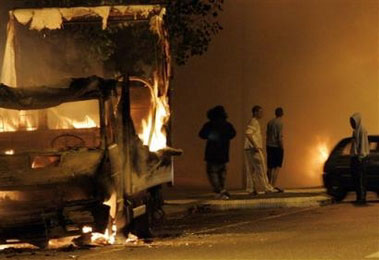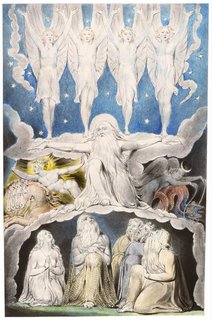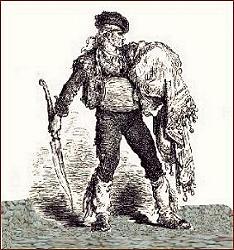
La propriété, c'est le vol!
Pierre-Joseph Proudhon, What is Property? Or, an Inquiry into the Principle of Right of Government.
****
Some of us see property ownership as the ownership of self. By extension, ones possessions are self, being not the value of the object but the life required to invest in the ownership of such. Proudhon's analysis of property goes in a different direction, into feudalist communitarianism, the neo-feudalist version of which we see in practice throughout modern European states today. They, like Marx, reduce property to commodity fetish. And thus, property crime (against others) is made trivial, denounced not for its assault on the person of property, i.e. the live-giving consumer but as an assault on those who expropriate! Look thus: if yoots burn 10,000 cars in France from Oct. to Nov. 2005, it is a right revenge of the alienated and marginalized in a racist society reclaiming their dignity in the face of exploitation and discrimination against the entrenched power of the ruling mode of producers, (not the elites but the working classes!) Property is reduced to commodity fetish if it's the property of the workers stolen or destroyed by the (Muslim) lumpen-proletariat. The property owning masses, the French middle-classes, for example, are "products of production" in a specifically non-egalitarian and ostentatious way. A car is obviously a private possession. In a neo-feudalist community there cannot be social cohesion if one "values" ones own possessions as commodity fetish. Rather, one must value "Other" at ones expense, literally, and apologize for the exploitation and racism that privileges the native worker over the immigrant vandal. What is a car compared to a Human life? When seen from a communitarian view a car is a fetish value, a mistaken understanding of its innate value. All commodities should be held communally, cars and everything else, as decided by the gnostic wisdom of the Philosopher Kings. Those who own are thieves. Those who steal and destroy are freedom fighters. Those who protect their commodities are harmful of the whole of society of which they are in a privileged position by virtue of race. They are, by dint of accident, exploiters by racist existence. To steal from thieves and to re-appropriate for the general community is therefore to the good. 10,000 burnt cars is a social lesson in communitarianism and good citizenship.
Below we will see a different view of social engineering: from the communitarian feudalism of the relations of ownership to the new social relations of capitalism we willl see a social engineering project taught by capital punishment. To teach a communitarian world the value of private property, the hangman worked over-time to show that "this is not yours in a captialist economy-- even if in the communal society you came from 'property is theft.' "
Today we are seeing a reversal of the lessons the hangman taught.
****
From Publishers Weekly
In 18th-century Britain, most victims of capital punishment were hanged for property crimes-some as petty as the pilfering of spoons. A brutal and benighted age, we like to think, but to the author of this epic social history (originally published in 1991, it's now in its second edition), the gallows were an indispensable tool in inculcating the primary lesson-"Respect Private Property"-of a modern capitalist economy. Historian Linebaugh, co-author of The Many-Headed Hydra: The Hidden History of the Revolutionary Atlantic, explores how the disruption of a traditional economy of regulated guilds and agricultural commons by a capitalism built on cash wages and competitive markets worked itself out as crime and punishment. Customary forms of payment-in-kind, in which workers took part of the wood they sawed, the silk they wove, or the cargo their ship ferried as wages, were criminalized as theft of the owner's property; capitalists developed new methods of workplace control to circumvent workers' attempts to appropriate the fruits of their labor; and romantic criminal figures like the highwayman expressed working-class resentment at the economic transformations that forced them to steal to live. Linebaugh draws on diverse sources, including judicial archives, family budgets, dietary customs and the writings of Locke and Milton to paint both micro-historical character studies of condemned souls and a panorama of class struggle in proto-industrial Britain. The results are as teeming-and sometimes as confusing-as the London street itself, and the broad Marxian abstractions Linebaugh invokes do not always clarify things.
http://www.amazon.com/gp
****
Chapter 30: Impact of the Agricultural Revolution on Industry. The Creation of a Home Market for Industrial Capital
Commentary
The most general point being made in this chapter is that the clearing of the lands which, along with the bloody legislation, produced a proletariat available for work in capitalist industry, also created a market for the goods being produced by that industry. Hitherto, because most people produced what they needed, the market (or demand) for manufactured goods was quite limited. It was restricted to the wealthy with money to spend or to local exchange, often under conditions of barter or reciprocity within a community. Marx argues that the rise of a waged working class also meant the rise of a class of consumers who bought everything they needed in the market. Thus, the commercialization of production and distribution.
[....]
As we saw in chapter 28, the fact that peasants like these were thrown off the land did not automatically mean either that they would present themselves at the factory gates or that they would constitute a immediate market for capitalists' goods. The inability to produce ones own clothes does not automatically mean you have the money to buy them in the market or that buying them is the only way to obtain them, they could also be appropriated directly by those with little or no money. Along with the laws against vagabondage, aimed at creating a class of waged workers, went other laws aimed at preventing such direct appropriation of the goods produced in the factories, i.e., anti-theft laws which imposed the market as the only legitimate way of acquiring goods. These laws were every bit as bloody, perhaps more so, than those against vagabondage. In the 17th and 18th Century people were regularly hanged for petty "theft." Historian Peter Linebaugh has coined the term "Thanatocracy" for this kind of rule by death.
While this distinction between direct appropriation and buying with a wage may seem clear cut, historically it was not so neat. During the period of manufacturing it was commonplace, in many trades, for the workers to take part of their income in the form of directly appropriated means of production. For example, silk workers would appropriate extra pieces of silk cloth, shoemakers would keep excess leather, shipwrights would appropriate lumber, sailors would take tobacco being transported in their ships, etc. In each case the workers would either consume the material directly, sell it for money or they would work it up into a product (e.g., shoes) and sell that for money and thus earn extra income.
Later on, historically speaking, this kind of activity was criminalized, i.e., laws were passed attacking these non-wage forms of income and through them the real wage was lowered, making the workers poorer and the employers richer. Moreover, the struggle over such appropriation led to a variety of new methods of production: from hogsheads in shipping (to make "pilfering" more difficult) to Mirabeau's fabriques réunies in which workers could be watched over and their labor process more carefully controlled so that less "waste" would disappear.
http://www.eco.utexas.edu/~hmcleave/357ksg30.html
****We have seen recently that such things as self-defence against criminality in Briatain is criminal. We see daily that murder of civilians is appeased and even condoned by the elitists in the West. This is social engineering, the reverse of public hanging in the 18th and 19th century. We are learning the object lesson that we as private individuals do not own our own lives as property. To think so is to commit theft. For that we might well be killed.







